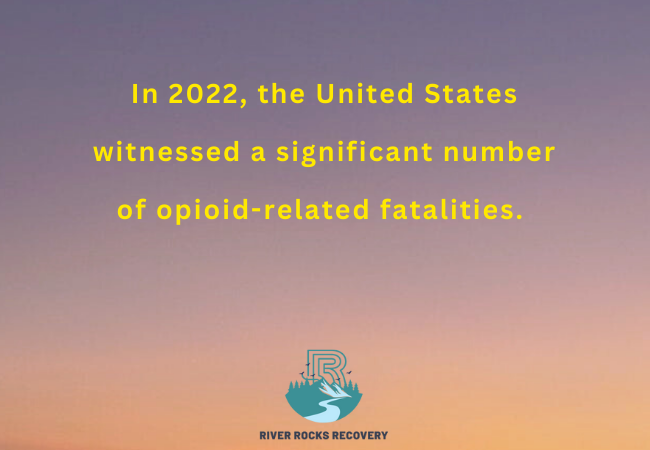The opioid and methamphetamine addiction crisis continues to devastate families and communities across the United States—especially in rural and suburban areas of the Midwest, including Ohio. These highly addictive substances alter brain chemistry, destroy physical and mental health, and make everyday functioning nearly impossible. Fortunately, comprehensive, evidence-based drug rehab programs can provide the tools needed to break free from addiction and rebuild a meaningful life.
At River Rocks Recovery, we treat both opioid use disorder (OUD) and methamphetamine addiction using a whole-person approach that addresses the physical, psychological, emotional, and social aspects of recovery. Whether you’re seeking an Addiction Treatment Program in Ohio, or more specific care like our Opiate Rehab Treatment or Meth Rehab Treatment, we provide multiple levels of support—from Partial Hospitalization Program (PHP) to Intensive Outpatient (IOP) and Outpatient care (OP).
The Neurobiology of Opioid and Meth Addiction
To understand why rehab is essential, we must first understand how these substances affect the brain.
Opioids and the Brain
Opioids bind to mu-opioid receptors in the brain and spinal cord, blocking pain and triggering a flood of dopamine—the chemical responsible for pleasure and reward. Over time, the brain reduces natural dopamine production, making the person dependent on opioids to feel normal.
Methamphetamine and the Brain
Methamphetamine is a potent central nervous system stimulant. It causes an abrupt and massive release of dopamine, far more than the brain naturally produces. This intense surge is responsible for the drug’s euphoric effects, but also burns out dopamine receptors, leading to long-term cognitive damage, anhedonia (inability to feel pleasure), and profound mental health deterioration.
Why This Matters for Treatment
Because both opioids and meth restructure the brain’s reward system, quitting without medical or psychological support is incredibly difficult. Withdrawal is not just uncomfortable—it can be dangerous and even life-threatening. That’s why professional rehab care is essential.
Signs You or a Loved One May Need Rehab
If you or someone close to you is showing these signs, it’s time to seek professional help:
Signs of Opioid Addiction:
- Use of multiple prescriptions or “doctor shopping”
- Withdrawal symptoms: flu-like symptoms, anxiety, sweating
- Nodding off or extreme drowsiness
- Mood swings, isolation, or unexplained financial issues
Signs of Meth Addiction:
- Staying awake for days at a time
- Violent or erratic behavior
- Hallucinations or severe paranoia
- Rapid weight loss and physical deterioration
How Drug Rehab Centers Treat Opioid and Meth Addiction Effectively
1. Medically Supervised Detox
Before therapy begins, detoxification helps the body eliminate harmful substances.
- For Opioids: Detox is supported by Medication-Assisted Treatment (MAT) using Suboxone®, methadone, or Vivitrol®.
- For Meth: While there’s no FDA-approved MAT for meth, supportive medications can help reduce cravings, improve sleep, and treat co-occurring anxiety or depression.
Detox typically lasts 5–10 days, but is just the first phase of treatment.
2. Comprehensive Clinical Assessment
Each client receives a full biopsychosocial evaluation to determine:
- The severity of addiction
- Co-occurring mental health disorders
- Past treatment history
- Family, social, and vocational needs
This information shapes a customized treatment plan for long-term success.
3. Evidence-Based Behavioral Therapies
At River Rocks Recovery, we rely on therapies proven to support lasting recovery, including:
- Cognitive Behavioral Therapy (CBT): Identifies and rewires destructive thought patterns.
- Dialectical Behavior Therapy (DBT): Builds emotional regulation and distress tolerance.
- Motivational Interviewing (MI): Helps clients move from ambivalence to action.
- Contingency Management (CM): Uses structured rewards to reinforce sobriety.
Therapies are offered through individual sessions, group counseling, and family therapy.
4. Medication-Assisted Treatment (MAT) for Opioids
MAT is an essential part of opioid rehab. It helps:
- Reduce physical cravings and withdrawal
- Normalize brain function
- Minimize relapse risk during early recovery
MAT is integrated into all levels of care, including outpatient treatment for clients transitioning back into everyday life.
5. Dual Diagnosis and Mental Health Integration
A significant percentage of those addicted to opioids or meth also suffer from co-occurring mental health disorders, such as:
- Major depression
- Anxiety disorders
- Bipolar disorder
- PTSD or trauma-related disorders
We provide integrated treatment to address both conditions simultaneously, ensuring more effective and holistic recovery.
6. Flexible, Tiered Levels of Care
River Rocks Recovery offers multiple levels of care to meet clients at different stages of recovery:
Partial Hospitalization Program in Ohio
- 5–6 days per week of structured clinical care
- Daily therapy, MAT management, and wellness programming
Intensive Outpatient Program in Ohio
- 3–5 days per week of therapy
- Ideal for transitioning from PHP or for those with work/family obligations
Outpatient Program in Ohio
- Weekly therapy, support groups, and medication management
- Designed for clients in long-term recovery who need maintenance care

Life After Treatment – Building a Relapse-Proof Recovery
1. Aftercare Planning
Before clients complete treatment, we help develop a personalized aftercare plan that includes:
- Sober living options
- Local support group connections (NA, AA, SMART Recovery)
- Access to ongoing counseling and alumni support
- Vocational and educational support, if needed
2. Relapse Prevention Education
Clients learn how to:
- Identify high-risk situations
- Use coping skills to manage cravings
- Recognize early signs of relapse
- Rebuild routines that promote sober living
3. Family Involvement and Support
Addiction affects the entire family. Our family therapy and education programs help repair relationships and establish healthy boundaries that promote long-term recovery.
Why River Rocks Recovery Is the Right Choice
At River Rocks Recovery, we are committed to compassionate, individualized treatment that empowers clients to recover with dignity.
- Licensed clinicians with experience in treating both opioid and meth addiction
- Integration of MAT, therapy, and holistic wellness practices
- Programs that balance structure and flexibility to support every recovery stage
- Located in a peaceful, recovery-focused setting in Ohio
Conclusion
Opioid and meth addiction can seem impossible to overcome—but with the right treatment, recovery is not only possible, it’s probable. The key is seeking help from a rehab center that understands your needs and is equipped to provide medical, emotional, and therapeutic care that addresses all aspects of your addiction.
River Rocks Recovery is here to walk with you every step of the way. Call 888.905.6281 today to speak with our admissions team.
Take the first step today—your future depends on it.
FAQ About Opioid and Meth Addiction Treatment
How do drug rehab centers treat opioid addiction?
Opioid addiction is typically treated using a combination of Medication-Assisted Treatment (MAT) and behavioral therapy. MAT involves medications like Suboxone®, methadone, or Vivitrol® to reduce cravings and prevent withdrawal symptoms. Therapy such as Cognitive Behavioral Therapy (CBT) helps address the emotional and behavioral aspects of addiction.
Is there Medication-Assisted Treatment (MAT) for meth addiction?
While there are no FDA-approved medications specifically for methamphetamine addiction yet, rehab centers use supportive medications like bupropion and naltrexone, along with intensive therapy and structured support, to help individuals reduce cravings and stay in recovery.
What is the difference between opioid and meth withdrawal?
-
Opioid withdrawal often includes flu-like symptoms (nausea, muscle aches, anxiety, insomnia).
-
Meth withdrawal is primarily psychological, involving depression, fatigue, sleep disturbances, and intense drug cravings.
Both require medical supervision for safe detox and effective transition into treatment.
What levels of care are available at River Rocks Recovery for these addictions?
We offer multiple levels of care based on the severity of the addiction:
-
Outpatient Program in Ohio
Each program includes a tailored combination of therapy, MAT (as needed), relapse prevention, and aftercare planning.
Do I need detox before entering rehab for opioids or meth?
Yes. A medically supervised detox is typically required to safely manage withdrawal symptoms before beginning therapeutic treatment. This helps reduce physical discomfort and improves readiness for long-term recovery.
What therapies are used to treat opioid and meth addiction?
-
CBT (Cognitive Behavioral Therapy)
-
DBT (Dialectical Behavior Therapy)
-
Motivational Interviewing (MI)
-
Group and individual counseling
These evidence-based approaches help clients manage triggers, rebuild coping skills, and change destructive patterns.




























